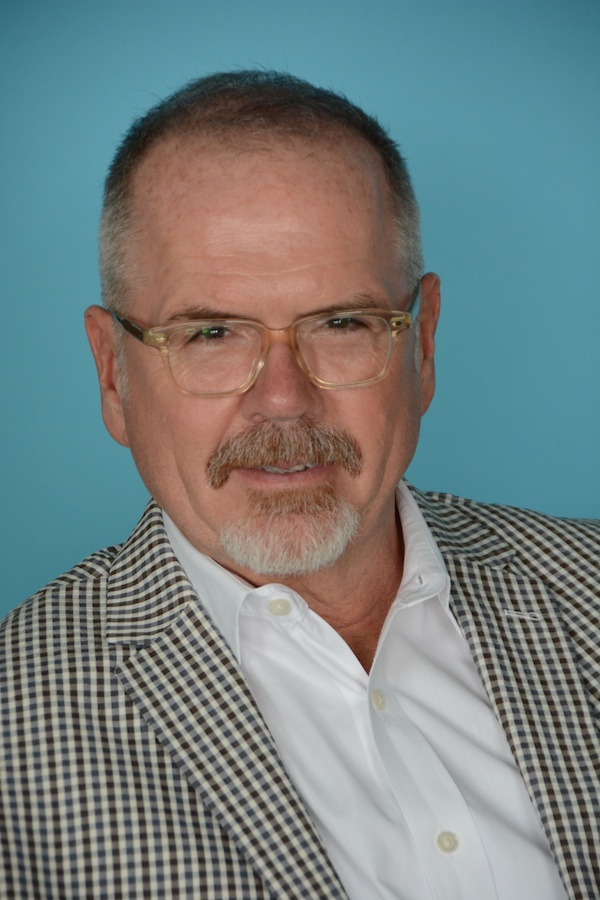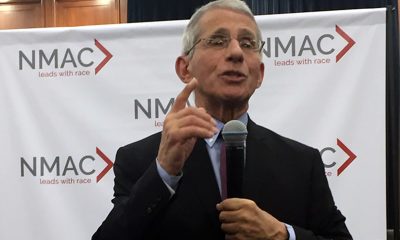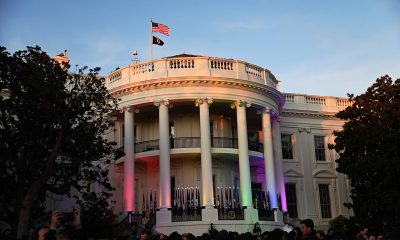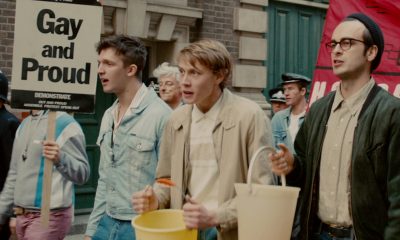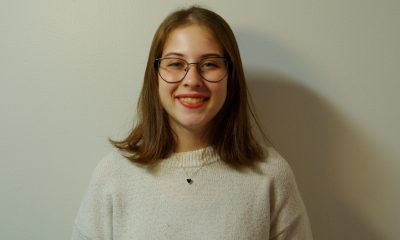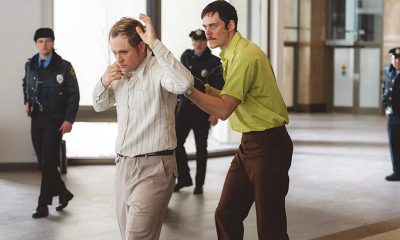Arts & Entertainment
From Larry Kramer to the ruby slippers
AFI DOCS festival continues through weekend
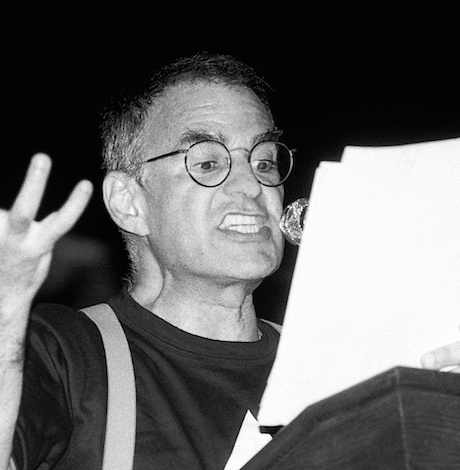
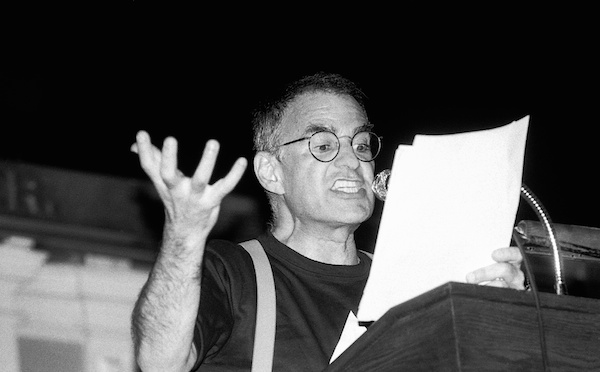
Larry Kramer speaking at a Boston Gay Town Meeting 6.9.87 at historic Faneuil Hall in Boston MA sponsored by the Boston Lesbian and Gay Political Alliance.
Openly gay film curator Michael Lumpkin is now also openly bi-coastal.
Since he was named executive director of AFI DOCS last December, Lumpkin has been splitting his time between the two coasts. After spending more than three decades in California, he’s enjoying life in the nation’s capital.
Every year, AFI DOCS brings the nest new documentaries from around the globe to Washington with dozens of screenings at AFI Silver in Silver Spring and other theaters throughout the District. Now in its 13th year, the festival runs through Sunday. The full schedule is at afidocs.org.
Lumpkin is thrilled with the slate of films that will be shown this year, but says that the selection process is very difficult.
“It takes several months,” he says. “We had close to 2,000 entries. Most of those are feature length films, but we also show short documentaries. We have a number of experienced screeners who send their evaluations to us. A screening committee goes through all the films that are rising to the top and then we make the final selections.”
Turning away talented filmmakers and exciting films is the worst part of the process.
“There are way more film that we would like to show than we can. There are so many great documentaries. That’s the hard part of the job — deciding what you’re not going to show. Deciding what you want to show is easy. Having to say, ‘Sorry we can’t include you’ to way too many great documentaries is the hard part.”
Looking over this year’s films, Lumpkin says he is excited by the latest film by Malcolm Ingram, director of “Bear Nation.”
“One that I’m really, really happy about is ‘Out To Win,’ a documentary about LGBT people in sports,“ he says. “Malcolm is one of my favorite filmmakers. I became aware of him with his film ‘Small Town Gay Bar.’ He’s a great filmmaker and a great guy.”
Lumpkin is also intrigued by “Larry Kramer In Love And Anger,” the new HBO documentary by Jean Carlomusto about the fiery author and AIDS activist.
“It’s interesting to look back at Larry and see his role in our community. He’s a volatile, very outspoken guy. It was so great to look back at these moments in LGBT history and activism. It’s a great bio-documentary that gives you the full picture of Larry.”
He adds, “There are a lot of great bio-documentaries in his year’s festival. I kinda go towards those a lot. I’m really into learning about people and their lives. We have documentaries about Steve Jobs and Nina Simone. We have a movie about the great arts patron Peggy Guggenheim. Closing night we’re featuring a movie about Mavis Staples, the great gospel singer.”
Two other films of special interest to the LGBT community are “Code: Debugging the Gender Gap” by Robin Hauser Reynolds, which looks at the absence of women in the coding industry, and “From This Day Forward,” a stunning film by Sharon Shattuck that explores her father’s gender identity struggles and how her parents have remained married through it all.
There’s also “Who Stole the Ruby Slippers?” a delightful short documentary that investigates the disappearance of one of the iconic pairs of ruby slippers from “The Wizard of Oz” from the Judy Garland Museum in her hometown of Grand Rapids, Minn. There are four programs of short documentaries throughout the festival.
Some other notable films that will be screened as part of AFI DOCS include “The Armor of Light,” a film by Abigail Disney about an evangelical leader who is forced to reconsider his views about gun control; “Very Semi-Serious” about Bob Mankoff, the quirky cartoon editor of “The New Yorker”; and “Welcome to Leith” which looks at how the resident of a small North Dakota reacted to the arrival of notorious white supremacist.
The love of documentaries has run through Lumpkin’s notable career, from when he ran the Frameline LGBT film festival for 25 years starting in the early ‘80s to today.
“Year after year, film after film, I would see people connecting with documentaries in a very different way than with fiction film. There’s something about it being truth and reality. I saw the special connection audiences have with documentaries.”
He also adds that AFI DOCS will include several opportunities for audience members to interact with the filmmakers and their subjects. Throughout the festival, there will be several Q&A sessions and panel discussions.
“For a fiction film, it’s great to have the director there, or a cast member who has just given a great performance. But to see a great documentary and then for the artist and the real person to be there, to be on stage, it’s a whole different reaction from audiences. I think it just goes much deeper.”
Lumpkin took several years off from his job at Frameline to produce the groundbreaking documentary “The Celluloid Closet” with Rob Epstein and Jeffrey Friedman. Based on the pioneering film criticism of Vito Russo, the fascinating documentary examines Hollywood representations of gay men and lesbians. Working on the film gave Lumpkin a renewed appreciation for the genre. For several years he ran the Documentary Association, an organization in Los Angeles that supports documentary filmmakers around the world. When the opportunity to get back into the festival business with AFI DOCS came along, he “jumped at the opportunity.”
Theater
Out dancer on Alvin Ailey’s stint at Warner Theatre
10-day production marks kickoff of national tour

Alvin Ailey American Dance Theater
Through Feb. 8
Warner Theatre
513 12th St., N.W.
Tickets start at $75
ailey.org
The legendary Alvin Ailey American Dance Theater is coming to Washington’s Warner Theatre, and one of its principal veterans couldn’t be more pleased. Out dancer Renaldo Maurice is eager to be a part of the company’s 10-day stint, the kickoff of a national tour that extends through early May.
“I love the respectful D.C. crowd and they love us,” says Maurice, a member of esteemed modern dance company for 15 years. The traveling tour is made of two programs and different casting with Ailey’s masterwork “Revelations” in both programs.
Recently, we caught up with Maurice via phone. He called from one of the quiet rooms in his New York City gym where he’s getting his body ready for the long Ailey tour.
Based in North Newark, N.J., where he recently bought a house, Maurice looks forward to being on the road: “I enjoy the rigorous performance schedule, classes, shows, gym, and travel. It’s all part of carving out a lane for myself and my future and what that looks like.”
Raised by a single mother of three in Gary, Ind., Maurice, 33, first saw Alvin Ailey as a young kid in the Auditorium Theatre in downtown Chicago, the same venue where he’s performed with the company as a professional dancer.
He credits his mother with his success: “She’s a real dance mom. I would not be the man or artist I am today if it weren’t for the grooming and discipline of my mom. Support and encouragement. It’s impacted my artistry and my adulthood.”
Maurice is also part of the New York Ballroom scene, an African-American and Latin underground LGBTQ+ subculture where ball attendees “walk” in a variety of categories (like “realness,” “fashion,” and “sex siren”) for big prizes. He’s known as the Legendary Overall Father of the Haus of Alpha Omega.
WASHINGTON BLADE: Like many gay men of his era, Ailey lived a largely closeted public life before his death from AIDS-related complications in 1989.
RENALDO MAURICE Not unusual for a Black gay man born during the Depression in Rogers, Texas, who’s striving to break out in the industry to be a creative. You want to be respected and heard. Black man, and Black man who dances, and you may be same-sex gender loving too. It was a lot, especially at that time.
BLADE: Ailey has been described as intellectual, humble, and graceful. He possessed strength. He knew who he was and what stories he wanted to tell.
MAURICE: Definitely, he wanted to concentrate on sharing and telling stories. What kept him going was his art. Ailey wanted dancers to live their lives and express that experience on stage. That way people in the audience could connect with them. It’s incredibly powerful that you can touch people by moving your body.
That’s partly what’s so special about “Revelations,” his longest running ballet and a fan favorite that’s part of the upcoming tour. Choreographed by Alvin Ailey in 1960, it’s a modern dance work that honors African-American cultural heritage through themes of grief, joy, and faith.
BLADE: Is “Revelation” a meaningful piece for you?
MAURICE: It’s my favorite piece. I saw it as a kid and now perform it as a professional dance artist. I’ve grown into the role since I was 20 years old.
BLADE: How can a dancer in a prestigious company also be a ballroom house father?
MAURICE: I’ve made it work. I learned how to navigate and separate. I’m a principal dancer with Ailey. And I take that seriously. But I’m also a house father and I take that seriously as well.
I’m about positivity, unity, and hard work. In ballroom you compete and if you’re not good, you can get chopped. You got to work on your craft and come back harder. It’s the same with dance.
BLADE: Any message for queer audiences?
MAURICE: I know my queer brothers and sisters love to leave with something good. If you come to any Ailey performance you’ll be touched, your spirit will be uplifted. There’s laughter, thoughtful and tender moments. And it’s all delivered by artists who are passionate about what they do.
BLADE: Alvin Ailey has been a huge part of your life. Thoughts on that?
MAURICE: I’m a believer in it takes a village. Hard work and discipline. I take it seriously and I love what I do. Ailey has provided me with a lot: world travel, a livelihood, and working with talented people here and internationally. Alvin Ailey has been a huge part of my life from boyhood to now. It’s been great.
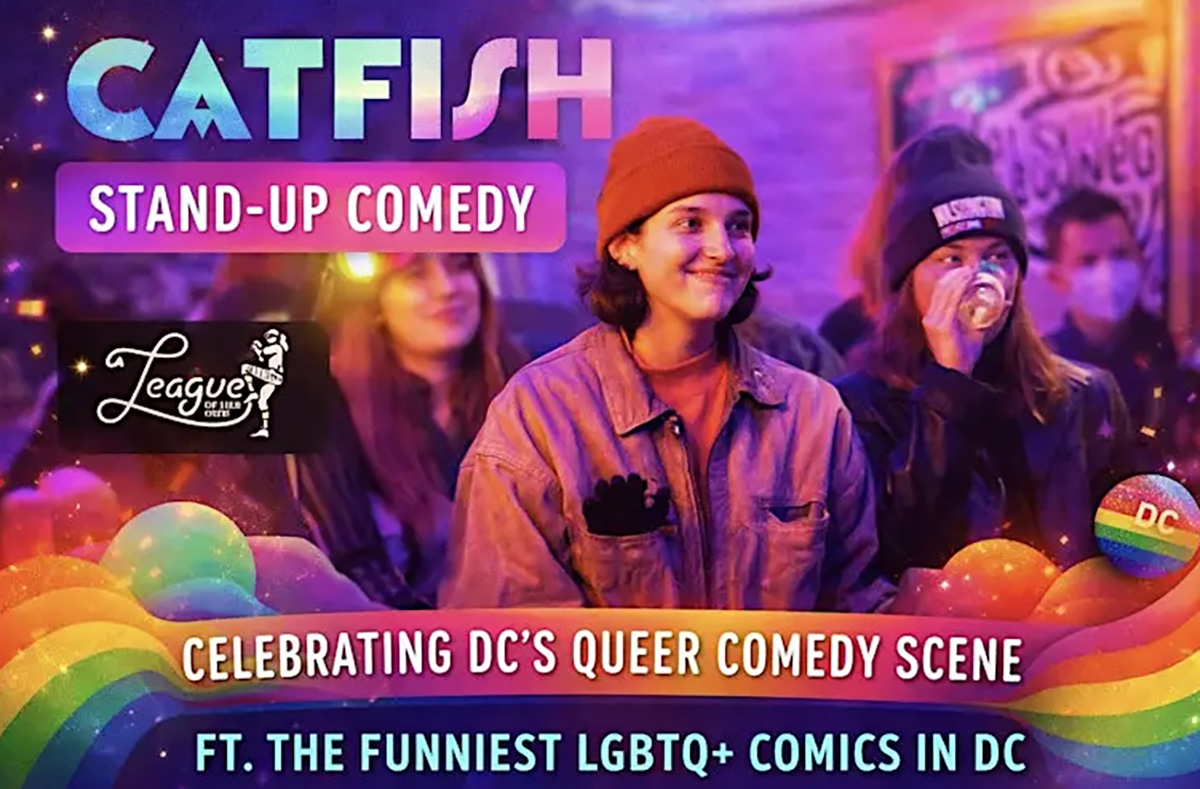
Catfish Comedy will host “2026 Queer Kickoff Show” on Thursday, Feb. 5 at A League of Her Own (2319 18th Street, N.W.). This show features D.C.’s funniest LGBTQ and femme comedians. The lineup features performers who regularly take the stage at top clubs like DC Improv and Comedy Loft, with comics who tour nationally.
Tickets are $17.85 and can be purchased on Eventbrite.
Arts & Entertainment
Catherine O’Hara, ‘Schitt’s Creek’ star and celebrated queer ally, dies at 71
Actress remembered for memorable comedic roles in ‘Beetlejuice’ and ‘Home Alone’
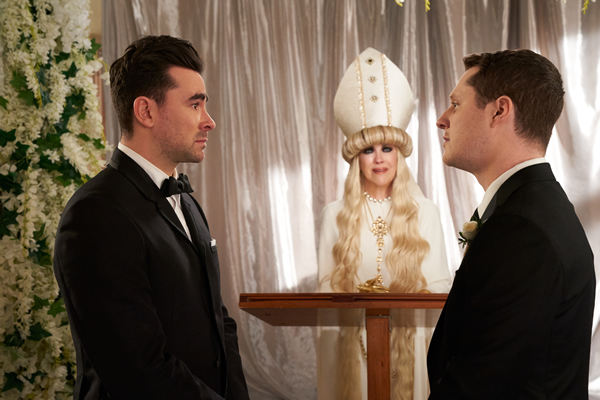
Catherine O’Hara, the varied comedic actor known for memorable roles in “Beetlejuice,” “Schitt’s Creek,” and “Home Alone,” has died at 71 on Friday, according to multiple reports. No further details about her death were revealed.
O’Hara’s death comes as a shock to Hollywood, as the Emmy award-winning actor has been recently active, with roles in both “The Studio” and “The Last of Us.” For her work in those two shows, she received Emmy nominations for outstanding supporting actress in a comedy series and outstanding guest actress in a drama series.
In 2020, O’Hara won the Outstanding Lead Actress in a comedy series award for her work in the celebrated sixth and final season of “Schitt’s Creek.” She was also known as a queer ally and icon for her theatrical and often campy performances over multiple decades. In “Schitt’s Creek,” she played Moira Rose, the wig-loving mother of David Rose (played by series creator Dan Levy). David is pansexual, but the characters around him simply accept him for who he is; the show was embraced by the LGBTQ community with how naturally David’s sexuality was written and portrayed. That show ran from 2015 to 2020 and helped bring O’Hara and her co-stars into a new phase of their careers.
In a 2019 interview with the Gay Times, O’Hara explained why the show got LGBTQ representation right: “Daniel has created a world that he wants to live in, that I want to live in. It’s ridiculous that we live in a world where we don’t know how to respect each other and let each other be. It’s crazy. Other shows should follow suit and present the world and present humans as the best that we can be. It doesn’t mean you can’t laugh, that you can’t be funny in light ways and dark ways. It’s all still possible when you respect and love each other.”
Additional credits include “SCTV Network” (for which O’Hara won a writing Emmy), “Beetlejuice Beetlejuice,” “Curb Your Enthusiasm,” “Six Feet Under,” “Best in Show,” “Home Alone 2: Lost in New York,” and “Dick Tracy.” O’Hara also lent her voice to “The Nightmare Before Christmas,” “Chicken Little,” “Monster House,” and “Elemental.” O’Hara was expected to return for Season 2 of “The Studio,” which started filming earlier this month.

